Who Is Known as a Dermatologist?
Dermatologists have the knowledge and expertise necessary to provide the finest treatment for the organ that looks after you. The skin is an amazing organ; it serves as your body’s first line of defense against sickness, protects your other organs, keeps you warm and cool, and conveys information about your internal health. A dermatologist is a medical professional who focuses on diseases of the skin, hair, and nails. Surprisingly, more than 3,000 disorders may be recognized and treated by a dermatologist doctor.
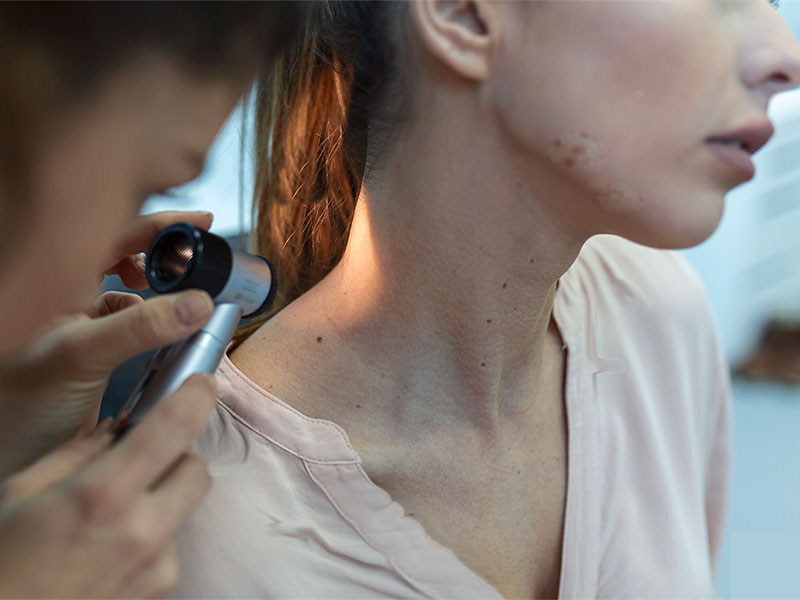
A single dermatologist doctor has considerable training, spending at least 12 years in school to learn how to recognize and manage more than 3,000 conditions affecting the skin, hair, and nails in addition to cosmetic issues. Dermatologists treat patients for problems that go well beyond superficial skin problems. Skin issues may make patients feel less confident in themselves, cause pain that can make daily tasks difficult, and, in severe cases, even endanger their lives.
Derma Definition and Dermatologist Meaning
The inner, thick layer of skin that lies under the outer, more visible epidermis is called the derma, sometimes referred to as the dermis. In several medical terminology, particularly in pathology, the suffix -derma is used expressly to refer to skin problems.
Dermatology is a branch of medicine that specializes on diseases of the skin, hair, nails, and mucous membranes. The skin is the largest organ in the body. It may be a trustworthy indicator of overall health and acts as the body’s first line of defense against infections and disorders. It’s crucial to confirm that the dermatologist is completely licensed or qualified before scheduling an appointment. Some employees of spas and beauty salons use the title “dermatologist,” although they are not qualified to do so.
A dermatologist is a medical professional who has had allopathic (MD) or osteopathic (DO) training and has finished a 3-year dermatology residency after completing a 1-year internship. They are experts in the identification and management of diseases that affect the skin, hair, nails, and mucous membranes.
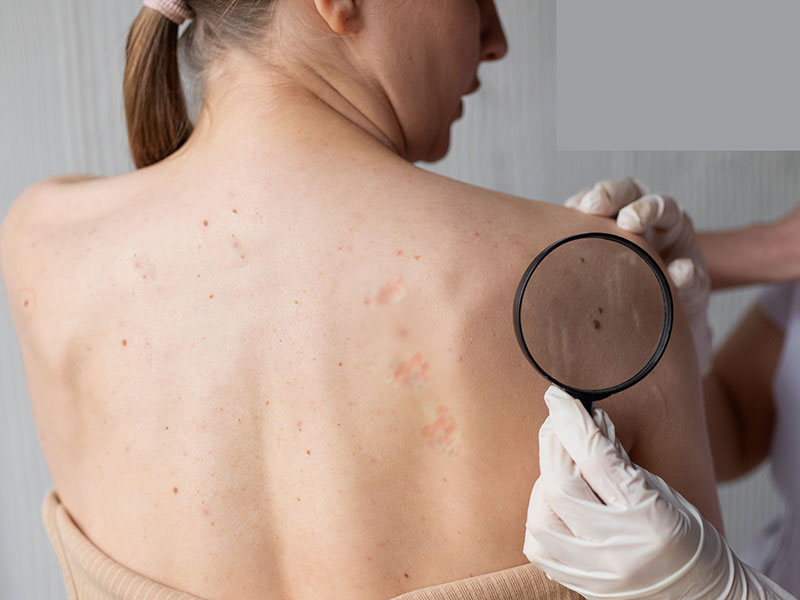
Dermatologists are trained to identify a wide range of skin conditions, from relatively minor ones like sunburn to more serious ones like skin cancer. They do screenings, examinations of the patient’s skin, and research the patient’s medical history in order to establish the most effective therapies. Dermatologists are also responsible for monitoring the effectiveness of the therapies and, if necessary, referring patients to other experts.
On any given day, if you were to see a dermatologist at work, you may witness them:
- Treat a baby’s noticeable birthmark if it poses a risk to the child’s eyesight
- Get rid of a mother’s fatal melanoma while it’s still curable
- Offer assistance to a student whose persistent eczema makes sleeping difficult
- Find the cause of a grandfather’s excruciating itching, which is a life-threatening liver ailment
- Treat a young woman’s hair loss, giving her the confidence, she needs to finish her job hunt
Procedures That a Dermatologist Doctor May Utilize
Dermatologists handle conditions affecting the skin, nails, and hair using a variety of medical and cosmetic methods. Many skin disorders may be treated with medications and noninvasive procedures, while others need more aggressive methods. These operations may be performed in a hospital or an outpatient environment like a doctor’s office, or even better, at your home! In the following, you see some procedures that a dermatologist may use to treat his/her patient’s skin problem(s).
A Dermatologist May Use Chemical Peels to Make Facial Skin Smoother
Chemical peels entail using a chemical solution that causes a layer of skin to peel off, exposing new, often smoother skin below. A dermatologist may utilize this method to treat certain forms of acne as well as sun-damaged skin. Additionally, it helps treat cosmetic issues including age spots and bags under the eyes.
Cryotherapy Is Good for Eliminating Afflicted Skin Cells
Warts are one of several benign skin conditions that may be quickly treated with cryotherapy. To eliminate the afflicted cells, the treatment includes freezing skin lesions, often using liquid nitrogen. Cryotherapy facials, which simply administer cold to the face, are used on certain persons. Others utilize a cryotherapy wand to concentrate the treatment on a particular region, such a sore joint.
Dermabrasion; A Noninvasive Method for Rejuvenating Facial Skin
Scar tissue, the appearance of small wrinkles and tattoos, and perhaps precancerous skin regions may all be reduced using dermabrasion. The top layer of skin is removed by a dermatologist using a swiftly moving brush.
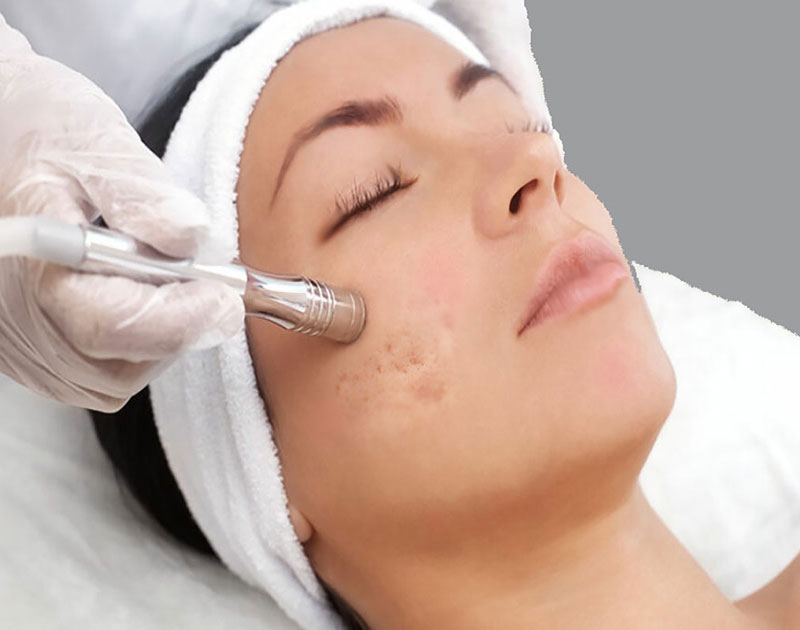
Microdermabrasion may exfoliate the skin, lessen aging symptoms, and improve skin evenness. All skin types may safely undergo the treatment. The process is typically carried out by a dermatologist doctor; however, some retailers provide kits for at-home use.
Excision of lesions
Excision biopsy is the term used to describe the entire eradication of a skin lesion. To eradicate skin cancer, such as basal cell carcinoma, squamous cell carcinoma, or melanoma, a skin lesion is often excised. Your dermatologist will describe the process and the reasons the skin lesion has to be removed to you. To demonstrate that you understand and consent to the surgical operation, you may be required to sign a consent form. The patient may be given a local or general anesthesia before to the removal depending on the extent of the lesion.
Hair Removal or Restoration
A dermatologist may employ transplanting among other techniques to treat hair loss. Lasers may also be used to eradicate undesirable body hair. Dermatologists utilize lasers to safely and efficiently eliminate unsightly face and body hair. Modern technology has made it safe for the majority of individuals to undergo laser hair removal. It may need six sessions or more to remove the unwanted hair. On the majority of body parts, laser hair removal is then long-lasting. It is not permanent on a woman’s face because of hormones. When the hair comes back, laser hair removal may be done again.
On the other hand, one important advancement has made it feasible to get outcomes that seem natural. Now, a few healthy hairs are transplanted at a time by the majority of dermatology experts. Patients no longer experience the artificial doll-like hair that was prevalent in the 1970s and 1980s. Back ago, thinning areas were covered with chunks of hair known as hair plugs. The hair plugs eventually were quite obvious. Enhancements to the hairline and placement of the hairs in the thinning regions also aid in producing outcomes that seem more natural. Because of these developments, the results can seem so natural that a barber or stylist would not know you had any work done.
While these developments are providing patients with outcomes that seem natural, the success still largely rests on the dermatologist you choose. You should choose a dermatologist doctor who has experience with hair transplants and is knowledgeable about hair loss. Dermatologists are experts in diseases that affect our skin, hair, and nails, and they are very knowledgeable about hair loss. Many can determine whether you are a suitable candidate for a hair transplant and many can do hair transplants.
Laser Surgery
Additionally, dermatologists may employ laser surgery to address a range of skin conditions or cosmetic problems. A form of surgery called laser surgery substitutes specific light beams for surgical equipment. There are several reasons to employ lasers in surgery. Some of the more widespread signs include the ones listed below:
- To eliminate tumors
- To rejuvenate facial skin
- To treat some skin problems such as warts, moles, tattoos, acne, scars, wrinkles, and unwanted hair
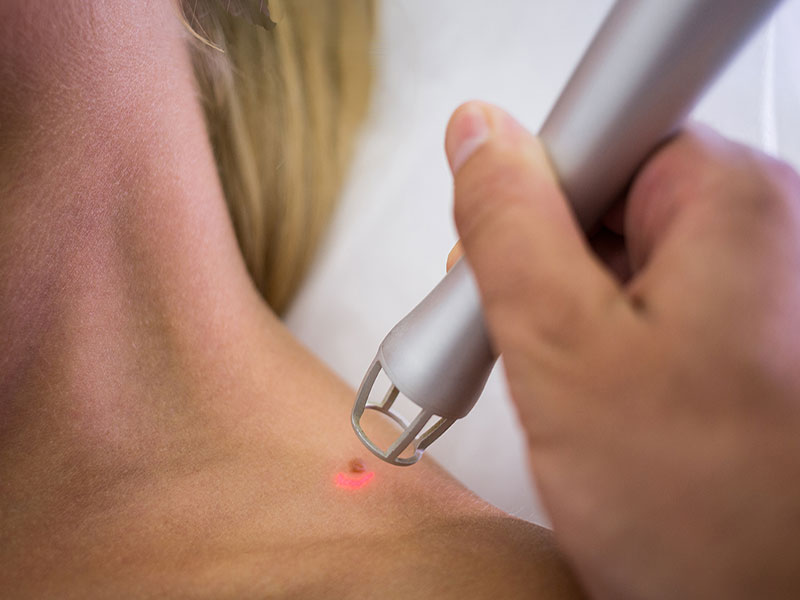
Mohs Surgery
The two most common kinds of skin cancer, basal cell carcinoma and squamous cell carcinoma, are often treated using Mohs surgery, which is thought to be the most efficient method. To get rid of malignant cells, the dermatologist first scrapes away layers of skin, which are then examined under a microscope. After that, they remove layers one after another until no more malignant cells remain. This operation takes particular skills to perform.
Skin Biopsies
In order to identify or maybe rule out certain disorders, a dermatologist would often take a skin biopsy. A biopsy is a kind of diagnostic technique that may assist medical professionals in identifying disorders. It requires taking a sample of the affected tissue or cells and delivering it to a pathologist for analysis, which is often performed using a microscope.
Skin grafts
Dermatologists may replace lost skin using skin grafts by utilizing skin from other parts of the body. Skin is removed from one area of the body and put to the area where skin is absent as part of a skin graft. This could come after the surgical excision of a skin tumor or after suffering a burn or another kind of damage. A skin graft is a free patch of tissue without its own blood supply; therefore, it is entirely dependent on the wound bed’s nutrition for life.
When One Needs to See a Dermatologist
You’ve probably dealt with skin issues like acne, rashes, dry skin, etc. at some time in your life. A dermatologist, a physician who focuses on skin care, must be consulted for treatment of several skin, hair, and nail issues since they don’t go away on their own. How do you know when it’s time to seek assistance with the diagnosis, control, and treatment of a chronic skin condition? When to contact a dermatologist may be determined by looking at this list of the top skin, nail, and hair issues.
Chronic Acne
All of us have experienced breakouts and blackheads, but for many individuals, over-the-counter treatments are ineffective. It’s time to consult a doctor if your acne is severe and covers a large portion of your body or face. A dermatologist may provide stronger topical and oral drugs that need a prescription, as well as more extensive therapies like chemical peels and laser procedures. It’s vital to start treatment as soon as possible since even minor acne may leave behind permanent scars.
Red and Inflamed Skin
Eczema is a skin ailment that causes the skin to be red, itchy, and swollen. According to the National Eczema Association, eczema affects more than 10% of the people around the world and may cause a wide range of skin conditions. Additionally, persistent redness or flushing of the face may be a sign of rosacea. If you have dry skin, redness, burning, or lumps that resemble pimples, make an appointment with a dermatologist so your doctor can diagnose you.
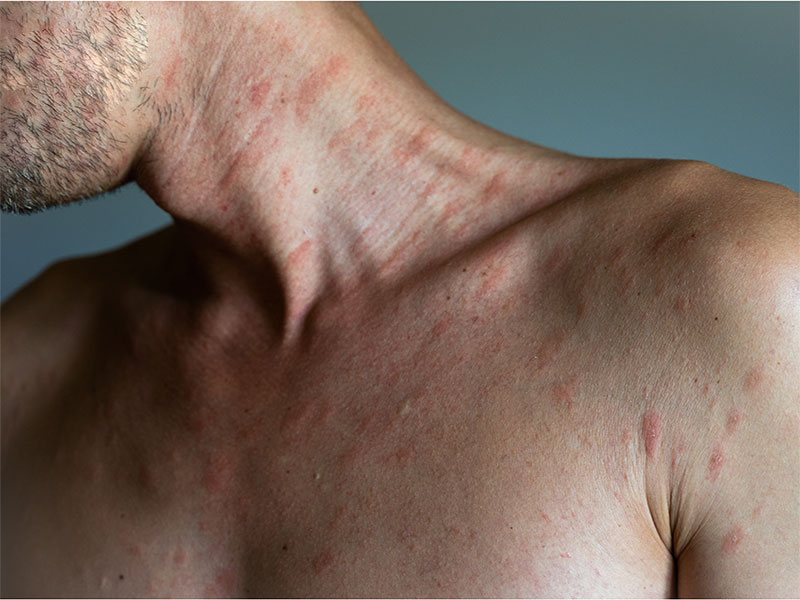
Skin Growths and Moles
Although skin tags and moles might be unsightly, they usually don’t need to be treated by a doctor. Make an appointment to visit a dermatologist, nevertheless, if you detect any changes in the size, color, texture, or form of moles or other skin growths. A professional examination of any suspected skin growths or moles might save your life. Some skin growths and moles turn into skin cancer.
Skin or Nail Infections
Bacteria, viruses, and fungus may all readily grow on your delicate skin and nails. Warts, pus, and discolored skin are all indications of an illness that requires medical treatment. A dermatologist can identify your issue and recommend a course of therapy.
Do We Have to Wait for a Dermatologist Appointment?
The average wait time for a dermatological appointment in America is 32.3 days. On the other hand, it takes Canadians 90 days on average to schedule a dermatology appointment. In these situations, the teledermatology may come in handy. Or, you have to hire or see a private dermatologist that may cost you a fortune. In teledermatology, you just need a good Internet connection to see your doctor.
With this article, if one asks you about dermatologist meaning, you can answer him/her that a specialist who has dedicated his/her life to learn and study anything related to the skin, hair, and nails is called dermatologist. Plus, you cannot call a spa employee – who is not licensed and has not any professional education – a dermatologist doctor.
RemoteDerm; Get Consultation with No Waiting Time
With the help of board-certified dermatologists, RemoteDerm provides Canadians with the best medical and cosmetic skin care available. Patients may have to wait months, travel a long distance, or even take time off from their busy jobs to see a dermatologist since there is a severe dermatologist shortage in Canada. Even while teledermatology has its own restrictions, many skin disorders may be effectively identified by collecting a thorough history and looking at high-quality photos.
FAQ
Do dermatologists do surgery?
Many dermatologists undertake minor surgery, such removing moles or warts or taking skin biopsies. Other dermatologists will likely focus their practice on more involved surgical procedures. During these treatments, benign cysts or cancerous growths on the skin may be removed.
How long must one study to become a dermatologist?
Up to 13 years are required to become a dermatologist. This encompasses the college years, medical school, and residency.
Is becoming a dermatologist tough?
Patients of different ages seek medical, surgical, and cosmetic treatments in the field of dermatology. Dermatology is one of the most challenging specialities to match into for these and other reasons.
Which degree is ideal for dermatologist?
Aspiring dermatologists must complete a bachelor’s degree program in biology, chemistry, or pre-med. Students should take as many science and mathematics classes as feasible, as well as psychology, anatomy, and physiology, and maintain excellent marks, since medical school admittance may be tough.

16 comments
Do I need a referral from my family doctor to see a dermatologist?
Hi Suzan,
No, you don’t need any referral from your family doctor, you can register at RemoteDerm.ca, answer few questions, upload images and start your treatment in matter of few hours
Hi! Thank you for the article.
But do dermatologists also treat hair loss? Like a hair doctor or something?
Hello emma! Thank you for your interest in our blog. Yes, dermatologists are experts at treating scalp conditions including hair loss and have an in-depth understanding of the various factors that contribute to it. Here is a comprehensive article about what dermatologists are able to do to address your hair loss.
Help me please
I have an emergency issue which I can’t wait to see a doctor (cause I have to go to another city for dermatologist) how long it takes to see a dermatologist?
Hello ava!
We are here to help! You can sign up on RemoteDerm and create your case (description + photos) and one of our board certified dermatologists will diagnose your skin condition and answer you in 12-48 hours
Click here for more information about our services
hi I have skin tags on my neck.can my family doctor remove these tags?
Hello mila! If you want to remove a skin tag, you can see your family doctor or a dermatologist. Skin tags can be removed at the office. But to reduce the risk of bleeding, cancer or other complications, it is still recommended that you have your tag checked by a dermatologist first.
I couldn’t find anything about allergies, do dermatologists also treat skin allergy conditions?
Hello Olivia. Yes, upon reviewing your symptoms and potential causes, your dermatologist will be able to determine if you have a skin allergy and prescribe medicine to treat it.
Is it necessary to see a dermatologist or can I treat my skin condition with over the counter products? I appreciate the information in the article, thank you for sharing!
While over-the-counter products can help treat some skin conditions, it’s always best to consult a dermatologist if you have a persistent or severe skin issue. A dermatologist can diagnose and provide the appropriate treatment plan for you.
Greaaaat article! I’ve been looking for information on what a dermatologist does and this article has really cleared things up for me. tahhanks a lot for the informative content 😀
Thank you for appreciating the article! We’re glad that it was helpful in answering your questions.
should I see a dermatologist for my herpes or a gynecologist?
For herpes, it’s recommended to consult a healthcare professional who specializes in sexually transmitted infections (STIs) or skin conditions, such as a dermatologist or an infectious disease specialist. They can provide an accurate diagnosis and appropriate treatment plan. If you have genital herpes, a gynecologist can also be consulted for comprehensive care and management. It’s important to seek professional medical advice for proper evaluation and guidance.